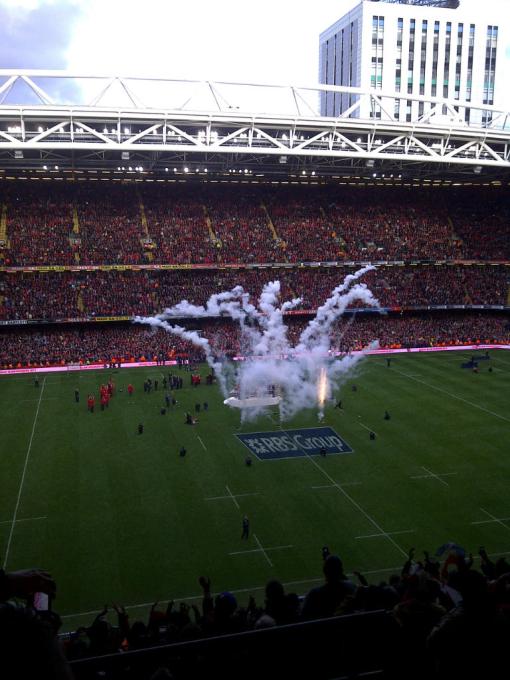On Saturday, Wales’s rugby players will try to prove they are the dominant force in European rugby.
But, according to one Millennium Stadium stalwart, the Principality already leads the world in one aspect of the game – crowd singing.
Haydn James has conducted the massed choirs on the pitch before kick-off at every home international since Wales played their home games at Wembley in the late 1990s.
“The rugby connection really started when they were building the Millennium Stadium,” he explained. “The WRU approached the London Welsh Male Voice Choir whom I conducted for 30 years, and said they wanted a bit of Welshness in Wembley. I conducted all six games there.”
The association proved enough to ensure Haydn was invited to Cardiff by the WRU on the team’s move home.
Standing on a red box, energetically leading both his choirs and the crowd in song, Haydn quickly became a permanent fixture at the newly built stadium.
Conducting, which Haydn describes as a “time-consuming hobby” – he has a PhD in Physics and worked in industry throughout his time with London Welsh – has taken him around the world on tour.
He travelled on the last three Lions tours to Australia, New Zealand and South Africa, and has performed at the Sydney Opera House on four occasions, twice with the Lions Choir. He has also already begun preparations for the 2013 Lions tour.
In the last year, Haydn has taken choirs to Barcelona and South America, with trips to Verona, Krakow and Los Angeles lined up.
But it is his association with rugby which has made him a familiar face on these shores, as he seeks to inspire the theatre of Welsh rugby into song.
He said: “A big difference between ourselves and many of the other countries is that the crowd will sing – and sometimes in four-part harmony. You don’t get that at any other stadium in the world.”
He believes the Welsh chapel tradition still drives enthusiasm for choral music today, and why the repertoire of the Cardiff crowd is so much broader than anywhere else.
“England? Swing Low – they don’t know anything else. Scotland? The only thing they really do now is Flower of Scotland, which is effectively their anthem anyway. It’s like us singing Hen Wlad Fy Nhadau all the time.
“You go to Paris, they only sing the Marseillaise. Ireland? They sing Fields of Athenry and that’s about the only thing.
“In Cardiff you will hear them singing Calon Lan, Delilah, Cwm Rhondda, Hymns and Arias and many others.”
The Cardiff crowd is supposed to have begun the tradition of pre-match anthem singing when spectators were led in song in response to New Zealand’s haka before Wales’s controversial 3-0 win in 1905.
Indeed, according to Haydn, the atmosphere today is returning to the tradition of bygone days, albeit with the help of choirs and a band. “I go back far enough to remember the days when we didn’t need a choir – the crowd just sang,”
“But what the WRU found was that over the years – and probably because of the demise of the chapels – there was not that automatic community singing.
“One of the reasons we were invited to Wembley was to try to get the crowd singing.”
Haydn argues music is also a tool for Welsh fans to show hospitality to visiting fans and as well as favourites like Loch Lomond and Fields of Athenry his choirs also learn the national anthems of all away sides.
The anthems I treat very, very seriously and will not mess about with them. My aim is to treat every anthem as seriously as I hope they treat the Welsh anthem when we go abroad.”
During the early 2000s, Wales followed most other nations by having soloists lead the anthem singing.
“Many of our top singers came along to perform the anthems, but we felt the crowd were listening rather than singing, so the decision was made to rely solely on the choirs and band to get them singing again.”
And he believes a passionate, sell-out crowd will have a vital role to play in spurring Wales on to beating the “dangerous” French this weekend.
“What we want is that, even if they are behind, [we] try and lift them with singing. When you get Hymns and Arias and Cwm Rhondda around the stadium you can’t miss it, however focused you are on the game.”
Haydn is optimistic the team, with the crowd in full support, can finalise a Six Nations clean sweep.
“The Welsh team take nothing for granted but they are on a roll. I supported the team during that great era in the early 1970s when there was clearly an immense pride and confidence in pulling on that red jersey. That confidence has now returned and it’s great to see.”
“With the home advantage it ought to be another Grand Slam.”







